Leaving a kitten alone while at work can be a source of concern for many pet owners. However, with the right preparation and care, you can ensure that your kitten is safe and secure while you’re away. Follow these tips to create a comfortable environment for your kitten and ease any worries you may have.
Key Takeaways:
- Prepare a safe environment for your kitten by removing potential hazards and providing essential amenities.
- Gradually acclimate your kitten to alone time by starting with short periods and gradually increasing duration.
- Create a calming environment with casual departures, comforting items, and background noise.
- Provide mental stimulation for your kitten with toys and activities that offer engagement.
- Ensure access to food, water, and consider companionship options for your kitten.
Preparing a Safe Environment for Your Kitten
Before leaving your kitten alone, it’s important to create a safe environment for them. Here are some key steps to take:
- Remove any potential hazards from the area where the kitten will be staying. This includes items such as glass objects, cleaning products, and poisonous plants. Creating a hazard-free zone will help ensure your kitten’s safety.
- Set up a comfortable space for your kitten. Provide a warm bed where they can rest and relax. Place fresh water in a securely placed bowl or water dispenser to keep them hydrated. And don’t forget to set up a litter tray in a quiet corner to encourage proper toileting.
- Consider securing any electrical cords or wires that may be within your kitten’s reach. Kittens are curious and may chew on these, which can pose a danger to their safety.
By taking these precautions, you can help create a secure environment for your kitten while you’re away.
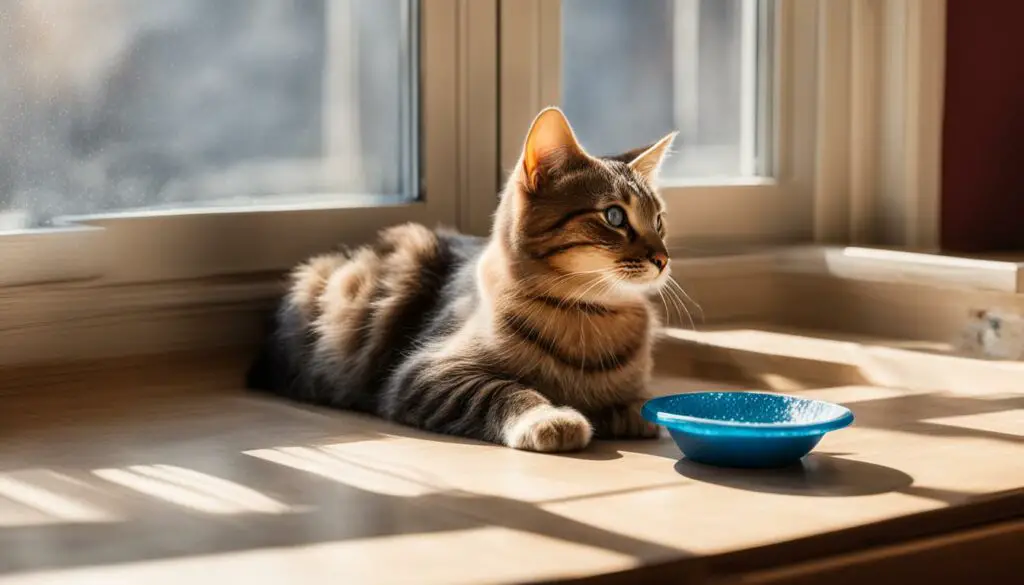
It’s essential to ensure that your kitten has a safe and comfortable space to stay in while you’re at work. Remember to remove any potential hazards and provide the necessary amenities such as a bed, fresh water, and a litter tray. Taking these steps will help keep your kitten safe and secure during their alone time.
Getting Your Kitten Accustomed to Alone Time
Leaving a kitten alone for extended periods can be a challenge, but with proper training, you can help them become comfortable with being alone. Gradually acclimating your kitten to alone time is key to preventing anxiety and ensuring their well-being. Here are some tips on how to leave a kitten alone:
- Start with short absences: Begin by leaving your kitten alone for short periods of time, such as 10-15 minutes. This allows them to familiarize themselves with being by themselves without feeling overwhelmed.
- Provide toys and activities: Leaving your kitten with toys and activities can help keep them entertained while you’re away. Interactive toys, puzzle feeders, or treat dispensers are great options to mentally stimulate your kitten and prevent boredom or anxiety.
- Gradually increase alone time: As your kitten becomes more comfortable with short absences, gradually increase the duration. Extend the time you’re away by 5-10 minutes each day until you reach the desired length of time. This helps build their confidence and reduces separation anxiety.
Remember to always leave your kitten in a safe and secure environment. Ensure they have access to fresh water, a litter tray, and a cozy bed. By following these steps, you can help your kitten adjust to being alone and ensure their well-being.

Useful Tip:
If you have a particularly anxious or clingy kitten, consider using pheromone diffusers or sprays. These products release calming scents that mimic the natural pheromones produced by mother cats, which can help soothe your kitten and reduce anxiety. Consult with your veterinarian for recommendations and proper usage.
Creating a Calming Environment for Your Kitten
When leaving your kitten alone during work hours, it’s important to create a calming environment to help alleviate any anxiety they may experience. By following these tips, you can ensure that your kitten feels safe and secure while you’re away.
Minimizing Departure Anxiety
To keep your kitten calm, avoid making a big fuss when you leave. Instead, practice casual departures and gradually increase the time you spend away from them. This will help them become accustomed to your absence and reduce separation anxiety.
Creating a Comfortable Space
Provide your kitten with a safe and comfortable space. Place soft blankets or a warm water bottle in their bed to create a cozy environment. This can help them feel secure and relaxed while you’re not home.
Background Noise for Soothing Effect
Leaving the radio or television on as background noise can provide a calming effect for your kitten. The familiar sounds can help mask any sudden noises and make them feel like they have company in the house.
By implementing these strategies, you can help create a calming environment that will keep your kitten relaxed and content while you’re away at work.
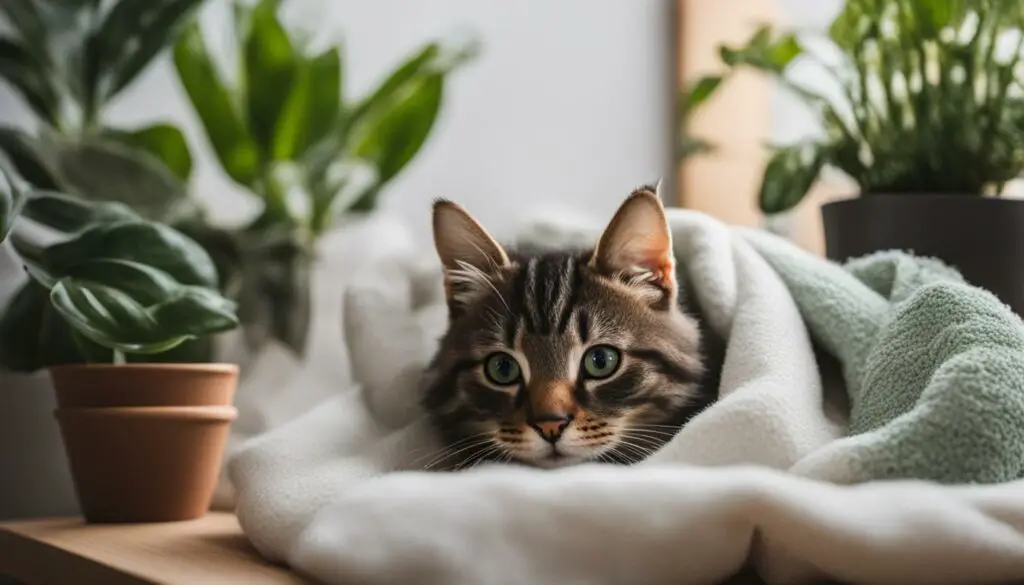
Section 5: Providing Mental Stimulation for Your Kitten
When leaving your kitten alone, it’s important to provide them with mental stimulation to prevent boredom and destructive behavior. Toys can be a great way to keep your kitten entertained and engaged while you’re away. There are several options available that are specifically designed to provide mental stimulation for kittens.
Table: Recommended Toys for Kittens Left Alone
| Toy | Description |
|---|---|
| Interactive Puzzle Feeder | This toy combines feeding time with mental stimulation. It requires your kitten to figure out how to access their food, keeping them engaged and entertained. |
| Treat Dispensing Ball | Filled with treats, this ball encourages your kitten to play and work for their rewards. As they bat the ball around, treats are slowly released, providing mental stimulation. |
| Feather Wand | The feather wand is a classic toy that taps into your kitten’s natural hunting instincts. The movement of the feather mimics prey, keeping your kitten engaged and providing mental stimulation. |
It’s important to provide a variety of toys and rotate them regularly to keep your kitten interested. This will prevent them from becoming bored with their toys and ensure they continue to receive mental stimulation. Additionally, consider engaging in playtime with your kitten when you’re home to provide them with social interaction and mental exercise.
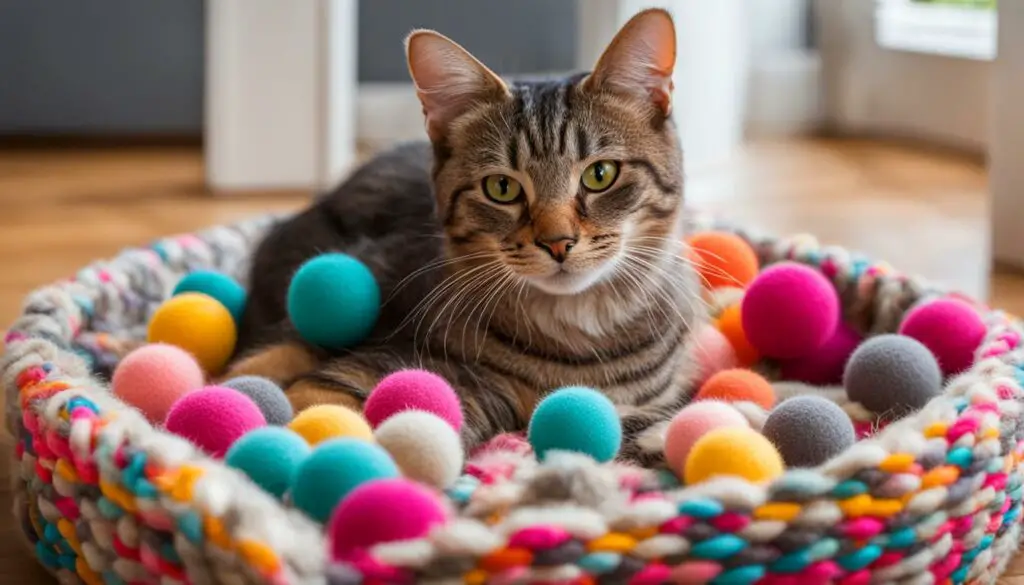
Remember, every kitten is unique, so it may take some trial and error to determine which toys your kitten enjoys the most. Observe their behavior and preferences to find the toys that provide the most mental stimulation and entertainment for them while you’re away.
Ensuring Access to Food and Water
When leaving your kitten alone, it’s essential to ensure they have access to fresh food and water throughout the day. Providing them with nourishment and hydration will help keep them happy and healthy while you’re at work.
To ensure your kitten has access to food, leave out a sufficient amount of dry or wet food in a securely placed bowl. This will prevent them from running out of food and feeling hungry. If you’re unsure about the appropriate amount to leave, consult your veterinarian for guidance.
In addition to food, fresh water is crucial for your kitten’s well-being. Make sure to provide them with a clean and securely placed water bowl or a water dispenser that can supply fresh water throughout the day. This will help keep your kitten hydrated and prevent them from becoming dehydrated in your absence.
| Food | Water |
|---|---|
| Leave a sufficient amount of dry or wet food in a securely placed bowl | Provide a clean and securely placed water bowl or water dispenser |
| Consult your veterinarian for guidance on the appropriate amount of food to leave | Ensure the water is fresh and accessible throughout the day |
| Consider using an automatic feeder for portion control and scheduled feeding | Check the water level regularly and refill as needed |
It’s also important to consider the quality of the food and water you provide for your kitten. Choose high-quality cat food that meets their nutritional needs and opt for fresh, clean water. Avoid leaving out expired or stale food, as it can be harmful to your kitten’s health.
By ensuring access to food and water, you can provide your kitten with the nourishment and hydration they need to thrive while you’re away. Remember to check the supplies regularly and make any necessary adjustments to accommodate your kitten’s changing needs.

Considering a Companion for your Kitten
Leaving a kitten alone while at work can sometimes lead to feelings of loneliness and boredom. To alleviate these concerns, one option to consider is getting a companion for your kitten. Having another kitten can provide them with social interaction and entertainment while you’re away. It’s important, however, to carefully consider the compatibility between the kittens and introduce them gradually to ensure a positive relationship.
A companion can help keep your kitten engaged and prevent feelings of loneliness. Kittens are social creatures and having a playmate can provide them with the necessary social interaction they need. Make sure to choose a companion that matches your current kitten’s personality and energy level. Introducing them gradually can help them form a bond and create a positive and stimulating environment.
When introducing a new kitten, allow them to explore each other’s scents by swapping bedding or using interactive toys. This can help them become familiar with each other’s presence. As they begin to interact, monitor their behavior for any signs of aggression or discomfort. It’s normal for them to establish their hierarchy through play, but if any aggressive behaviors persist, separate them and consult a veterinarian or professional animal behaviorist for guidance.
Adding a companion to your kitten’s life can provide them with a source of companionship and stimulation. It’s important to ensure that both kittens receive individual attention and care from you as their owner. With patience and proper introduction, a companion can help alleviate the loneliness your kitten may experience while you’re away.

Addressing Separation Anxiety
When it comes to leaving a kitten alone, separation anxiety can be a common issue that pet owners face. Kittens are naturally social animals and may experience distress or excessive crying when left alone. However, there are steps you can take to help your kitten overcome separation anxiety and reduce their stress levels.
Recognizing the Signs
The first step in addressing separation anxiety is to recognize the signs. Common signs of separation anxiety in kittens include excessive meowing, destructive behavior, refusing to eat or use the litter tray, and seeking constant attention. If your kitten exhibits these behaviors when left alone, it’s important to address their anxiety and find ways to make them feel more secure and comfortable.
Gradual Desensitization
One effective method to help kittens with separation anxiety is gradual desensitization. Start by leaving your kitten alone for short periods of time and gradually extend the duration as they become more accustomed to being by themselves. This process helps them adjust to your absence and builds their confidence in being alone. It’s important to praise and reward your kitten when they remain calm and relaxed during these practice sessions.
| Tips to Help Reduce Separation Anxiety | Example |
|---|---|
| Establish a consistent routine | Stick to a regular feeding, playtime, and alone time schedule. |
| Provide comfort objects | Leave behind items with your scent, such as a blanket or t-shirt, to provide reassurance. |
| Use calming aids | Consider using pheromone sprays or diffusers designed to reduce anxiety in cats. |
| Seek professional help | If your kitten’s separation anxiety persists or worsens, consult with a veterinarian or animal behaviorist for further guidance. |
Remember, addressing separation anxiety takes time and patience. Be consistent in your approach and provide a loving and supportive environment for your kitten. With proper care and attention, you can help them overcome their anxiety and develop a sense of security even when you’re not at home.
By following these strategies and providing a secure environment for your kitten, you can help reduce their separation anxiety and create a happier and more relaxed atmosphere for both you and your furry friend.
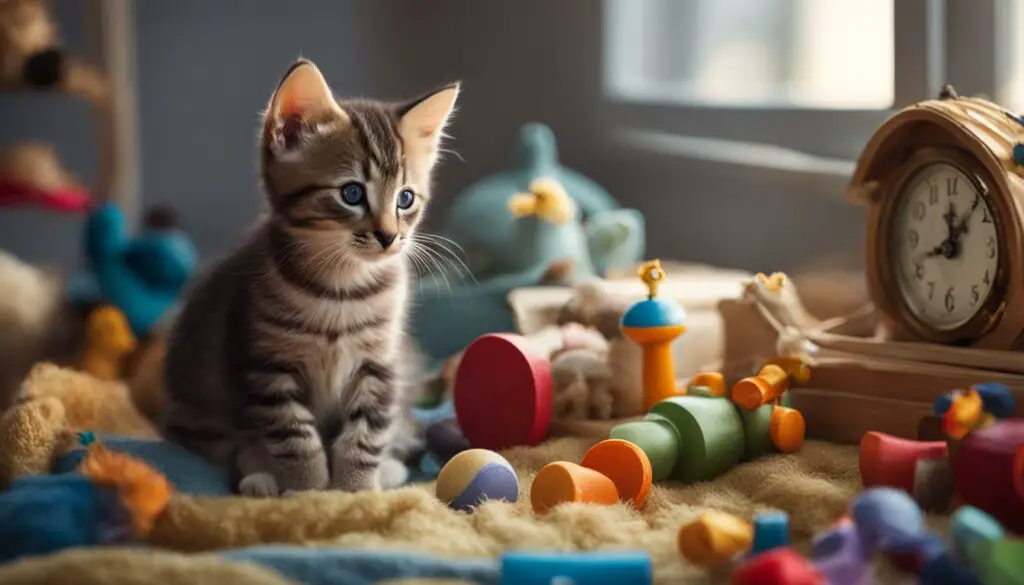
Nighttime Considerations for Your Kitten
If you’re leaving your kitten alone at night, you may wonder whether to leave the light on. While cats have excellent night vision and can navigate in the dark, it can be comforting to leave a night light or dim light on until your kitten becomes more familiar with their surroundings. As they grow more confident, you can gradually turn off the lights.
“Leaving a light on at night can provide a sense of security for your kitten, especially if they are still adjusting to their new environment,” says Dr. Jane Thompson, a veterinarian specializing in feline behavior. “It can help them feel less anxious and navigate their surroundings more easily.”
Having a dim light on can also help prevent accidents or injuries during the night. Kittens are curious creatures and may stumble upon objects or furniture in the dark. By providing a subtle source of illumination, you can minimize the risk of accidents and help your kitten feel safer.
However, it’s important to note that leaving a light on should not be a permanent solution. As your kitten grows older and more familiar with their environment, they should be able to navigate in the dark without any issues. Gradually reducing the reliance on artificial light can help promote their natural ability to adapt to different lighting conditions.

Table: Pros and Cons of Leaving the Light on for Your Kitten at Night
| Pros | Cons |
|---|---|
| Provides a sense of security | May disrupt natural sleep patterns |
| Minimizes the risk of accidents | Can create dependency on artificial light |
| Helps kittens navigate in unfamiliar environments | May interfere with their natural ability to adapt to different lighting conditions |
Understanding Kittens’ Need for Companionship
Kittens, like any social beings, can experience loneliness when left alone for extended periods. It’s important to recognize the signs of loneliness in your kitten, such as increased clinginess or excessive meowing. Providing them with plenty of toys, playtime, and interaction when you’re present can help alleviate their loneliness. If it suits your family and your kitten’s personality, considering getting them a companion can also help prevent loneliness.
If you notice that your kitten seems bored or sad when left alone, it may be a sign that they crave companionship. Kittens are naturally social animals and thrive on interaction and play. By providing them with a playmate, you can ensure that they have a constant source of companionship and stimulation.
When choosing a companion for your kitten, it’s important to consider their age, temperament, and compatibility. Introduce them gradually and monitor their interactions to ensure that they get along well. Having a companion can not only alleviate loneliness but also provide mental and physical stimulation, helping your kitten develop into a well-adjusted and happy adult cat.

“Kittens are naturally social animals and thrive on interaction and play.”
| Signs of Kitten Loneliness | Ways to Alleviate Loneliness |
|---|---|
| Increased clinginess | Provide plenty of toys and playtime |
| Excessive meowing | Interact and engage with your kitten when you’re present |
| Withdrawn behavior | Consider getting a companion for your kitten |
Conclusion
Understanding the need for companionship is essential when leaving a kitten alone. By recognizing the signs of loneliness and providing the necessary social interaction and stimulation, you can ensure that your kitten remains happy and content even when you’re not around. Whether through interactive play, toys, or a feline companion, there are various ways to combat loneliness and create a fulfilling environment for your kitten.
Should I Leave My Kitten Alone Overnight?
Leaving a kitten alone overnight can be a concern for pet owners, but with proper preparation, it can be safe for your furry friend. As a responsible pet owner, ensuring that your kitten is in a secure and comfortable environment is crucial. Providing access to food, water, and a litter tray is essential during the night.
If your kitten is still young and requires frequent feeding or monitoring, it is advisable not to leave them alone overnight. However, if your kitten is old enough and in good health, leaving them alone overnight can be an option. Ensure that you have set up a safe space for them, free from any potential hazards.
Consider leaving a night light or dim light on initially to help your kitten feel secure. Cats have excellent night vision, but it can take time for them to adjust to new surroundings. Monitoring your kitten’s behavior during the night can help you determine if they are comfortable being alone or if adjustments need to be made.
| Pros of Leaving a Kitten Alone Overnight | Cons of Leaving a Kitten Alone Overnight |
|---|---|
| Allows your kitten to develop independence | Increase in separation anxiety |
| Less disruption to your sleep patterns | Potential accidents or messes |
| Encourages self-soothing and self-reliance | Possible loneliness or distress |
It’s important to note that every kitten is unique, and their comfort levels may vary. Some kittens may adapt well to being alone overnight, while others may struggle with separation anxiety or loneliness. Monitoring their behavior and seeking professional advice if necessary can help ensure their well-being.

Some Tips for Leaving Your Kitten Alone Overnight:
- Ensure they have access to fresh food, water, and a clean litter tray.
- Create a safe and comfortable space for them, free from any potential hazards.
- Consider leaving a night light or dim light on initially to help them feel secure.
- Monitor their behavior and seek professional advice if necessary.
“Leaving a kitten alone overnight can be a concern for pet owners, but with proper preparation, it can be safe for your furry friend.”
By considering your kitten’s individual needs and providing a loving and secure environment, you can make leaving them alone overnight a possibility. Gradually introducing alone time and monitoring their behavior can help determine if they are ready for this step. Remember to consult with your veterinarian for personalized advice to ensure the well-being of your kitten.
Understanding the Limits of Leaving Your Kitten Alone
Leaving your kitten alone for extended periods of time should be done with careful consideration. The length of time that a kitten can be left alone depends on various factors, including their age and development. Younger kittens, especially those under four months old, require more care and attention and should not be left alone for long periods. Their need for frequent meals, social interaction, and monitoring makes it important to have someone available to take care of them.
As kittens grow older and become more independent, they can handle being alone for longer durations. However, it is still important to recognize their limits and provide them with appropriate care and companionship. Leaving a kitten alone for more than 8-10 hours a day is generally not recommended. During this time, they may become bored, lonely, and may even engage in destructive behaviors.
If you need to leave your kitten alone for longer periods, it is recommended to consider arrangements such as hiring a pet sitter, enlisting the help of a trusted neighbor or friend, or using a reputable pet daycare service. These options can provide your kitten with the necessary care, attention, and companionship they need while you are away.
Table: Maximum Recommended Alone Time for Kittens
| Age of Kitten | Maximum Recommended Alone Time |
|---|---|
| Under 4 months old | 2-3 hours |
| 4-6 months old | 4-5 hours |
| 6-12 months old | 6-8 hours |
| Over 12 months old | 8-10 hours |
It’s important to note that every kitten is unique, and their individual needs may vary. Some kittens may cope better with longer periods of alone time, while others may struggle even with shorter durations. It’s crucial to observe your kitten’s behavior and adjust their alone time accordingly. If you notice signs of distress, anxiety, or destructive behavior, it may be necessary to seek additional solutions to ensure their well-being.
Remember, kittens thrive on social interaction, mental stimulation, and companionship. Taking the time to understand their needs and providing them with appropriate care and attention will help ensure their happiness and well-being, even when you’re not able to be with them.
When to Seek Professional Advice
As a responsible pet owner, it’s crucial to pay attention to your kitten’s behavior and seek professional advice when necessary. While some behaviors may be normal, others could indicate underlying health or emotional issues that require attention. If you notice any of the following symptoms in your kitten, it’s time to contact a veterinarian for further evaluation:
- Excessive crying or meowing: If your kitten is displaying persistent distress vocalizations, it could be a sign of loneliness, anxiety, or pain.
- Refusal to eat or drink: Loss of appetite can be a red flag indicating illness or discomfort that requires medical attention.
- Changes in litter box habits: If your kitten suddenly stops using the litter box or shows signs of discomfort during elimination, it could be a sign of a urinary tract infection or other health issue.
- Withdrawn or depressed behavior: If your usually playful and social kitten becomes withdrawn, lethargic, or shows signs of depression, it could be a sign of an underlying emotional or medical problem.
When contacting a veterinarian, be prepared to provide specific details about your kitten’s symptoms, behavior changes, and any relevant medical history. The veterinarian will be able to assess your kitten’s overall health and provide guidance on the best course of action. Remember, early intervention is key to ensuring the well-being of your kitten.
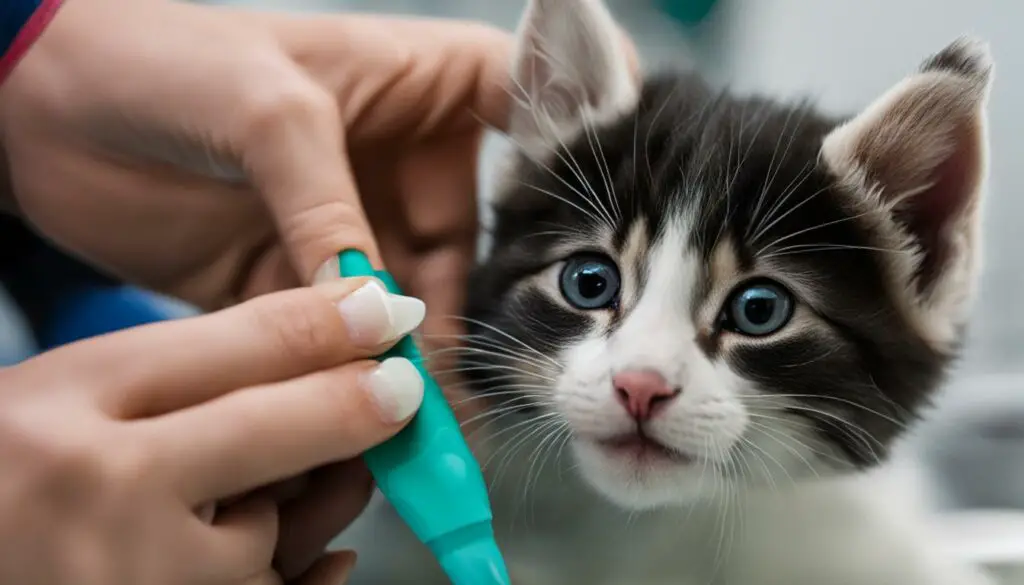
Providing a Loving and Patient Environment
When it comes to caring for a kitten while at work, creating a secure environment is essential for their wellbeing. As a responsible pet owner, I understand the importance of providing a loving and patient environment for my kitten, even when I’m not at home. By taking a few simple steps, I can ensure that my furry friend feels safe, comfortable, and cared for during my absence.
First and foremost, I make sure to set up a designated space for my kitten that is free from potential hazards. This means removing any toxic substances, fragile items, and small objects that could be dangerous if ingested. I also create a cozy and inviting area with a warm bed, toys, and a scratching post to keep my kitten entertained and engaged throughout the day.
To help my kitten feel secure, I establish a routine that includes gradual alone time. I start by leaving my kitten alone for short periods and gradually increase the duration as they become more accustomed to being alone. This helps them develop confidence and independence while minimizing any separation anxiety they may experience.
“Creating a secure environment is essential for their wellbeing.”
Additionally, I provide mental stimulation by rotating toys and offering puzzle feeders or treat-dispensing toys. This keeps my kitten mentally engaged and prevents boredom or destructive behavior. I also leave a radio or TV on as background noise to provide a sense of companionship and comfort in my absence.
By creating a loving and patient environment for my kitten, I can ensure their wellbeing while I’m at work. Whether it’s setting up a safe space, gradually introducing alone time, or providing mental stimulation, every step I take contributes to their overall happiness and security. With these measures in place, I can leave my kitten with confidence, knowing that they are well-cared for in a nurturing environment.
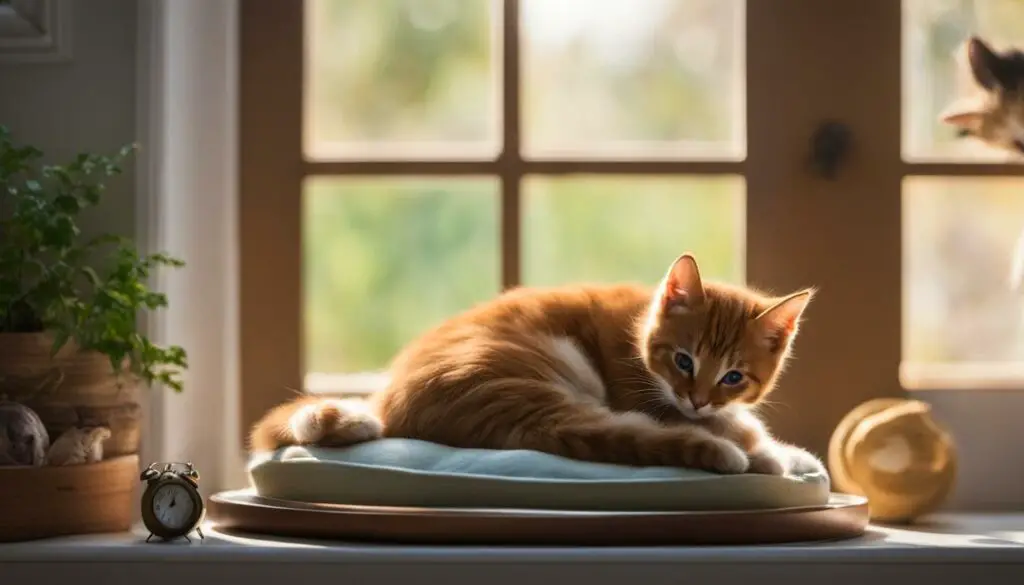
| Tips for Creating a Secure Environment | |
|---|---|
| 1. | Remove potential hazards such as toxic substances and fragile items. |
| 2. | Create a comfortable area with a warm bed, toys, and a scratching post. |
| 3. | Establish a routine with gradually increasing alone time to build confidence. |
| 4. | Provide mental stimulation with rotating toys and puzzle feeders. |
| 5. | Leave a radio or TV on as background noise for companionship. |
Conclusion
Leaving a kitten alone safely while at work is a common concern for many pet owners. However, by taking the necessary steps to ensure your kitten’s well-being, you can leave them with confidence.
First and foremost, creating a secure environment is crucial. Remove any potential hazards and set up a comfortable space with all the essentials your kitten needs, such as a warm bed, fresh water, and a litter tray.
Gradually acclimate your kitten to alone time by starting with short periods and gradually increasing the duration. Providing toys and mental stimulation will keep them entertained and prevent boredom. Consider getting a companion for your kitten to alleviate loneliness, if possible.
Always ensure access to food and water, and address any separation anxiety your kitten may experience. Seek professional advice if you notice significant changes in behavior. Most importantly, provide a loving and patient environment for your kitten, and remember that it may take time for them to adjust to being alone.
Leaving your kitten alone while at work is possible with the right preparation and care. By following these guidelines, you can ensure your kitten’s safety and well-being while you’re away, allowing you to go about your day with peace of mind.
FAQ
How can I prepare a safe environment for my kitten when leaving them alone?
Remove potential hazards, provide a warm bed, fresh water, and a litter tray.
How can I get my kitten accustomed to being alone?
Start by leaving them alone for short periods of time and gradually increase the duration. Provide toys and activities to keep them entertained.
What can I do to create a calming environment for my kitten?
Avoid making a big deal out of your departure, create a safe and comfortable space, and leave on background noise like the radio or TV.
How can I provide mental stimulation for my kitten when I’m not home?
Use puzzle feeders or toys filled with treats, rotate their toys, and provide activities that engage their minds.
How can I ensure my kitten has access to food and water while I’m at work?
Leave out enough food for the day and provide fresh water in a securely placed bowl or water dispenser.
Should I consider getting another kitten as a playmate for mine?
Having a companion can help alleviate boredom and loneliness. Make sure to consider compatibility and introduce them gradually.
What should I do if my kitten experiences separation anxiety?
Rule out any physical issues with a vet, create a gradual plan to help them overcome their anxiety, and provide comforting scents or objects.
Should I leave a light on for my kitten when I’m not home at night?
While cats can navigate in the dark, leaving a night light or dim light can provide comfort until they become more familiar with their surroundings.
Do kittens get lonely when left alone?
Yes, kittens can experience loneliness. Providing toys, playtime, and interaction can help alleviate their loneliness. Getting them a companion can also be beneficial.
Is it safe to leave a kitten alone overnight?
If your kitten is in a safe and comfortable environment with access to food, water, and a litter tray, it is generally safe to leave them alone. Monitor their behavior and adjust as necessary.
How long can kittens be left alone?
The length of time depends on their age and development. Younger kittens require more care and attention, while older kittens can handle longer durations. Provide appropriate care and companionship based on their needs.
When should I seek professional advice for my kitten’s behavior when left alone?
If you notice significant changes in their behavior, such as excessive crying or refusal to eat, it’s important to contact a veterinarian to rule out any underlying health issues or address additional measures.
How can I provide a loving environment for my kitten when I’m away?
Show them affection and attention when you’re home, gradually introduce measures to help them feel secure when alone, and be patient as they adjust to being alone.
Source Links
- https://www.purina.co.uk/articles/cats/behaviour/travel/leave-cat-at-home
- https://www.petbarn.com.au/petspot/kitten/behaviour-and-training-kitten/leaving-your-kitten-home-alone/
- https://petcube.com/blog/cats-home-alone/